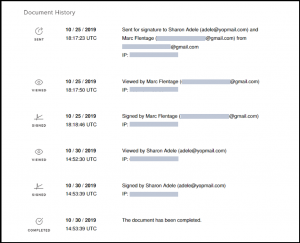BACK
Simple, easy online rental collection for you and your tenants.
In just a few clicks, sign and store leases and other documents online.
Serious security and convenience so you don’t have to worry about your data.
Manage work orders and your maintenance team all in one place.
Spread the word about your rentals to attract more tenants.
Innago access anywhere for you and your renters.
Understand your business better than ever before with insightful reports.
Protect yourself and your tenants now from future headaches.
Instant access to screening reports so you can find the best tenants.
BACK
Why Electronic Signatures Can Be More Secure
When we talk to clients about our online lease signing feature, we receive one of two reactions: the landlord immediately understands the convenience and is excited by such a useful feature available for free, or they’re suspicious of the validity of electronic signatures and disinterested in the whole idea.
While a positive reaction is always welcome, we’re actually more excited by the negative one. It gives us an opportunity to share some surprising information: electronic signatures are in fact more secure than their non-digital counterpart. Here’s why.
[Disclaimer: The materials and information provided by Innago are for informational purposes only and not for the purpose of providing legal advice. You should contact your attorney to obtain advice with respect to any particular issue or problem.]
Electronic Signatures Are Fully Recognized by the US Government
Let’s get the most important piece out of the way first. The ESIGN Act was signed into law (electronically, I might add) by President Bill Clinton on June 30th, 2000. It grants the same validity, effect, and enforceability to electronic signatures as their paper equivalents. This has been litigated and proven in court countless times and is simply not a legal question. What has become clear is that signature authenticity is often easier to prove when it originates electronically.
Signature Authentication
The electronic signature process is not the wild west. You can’t simply hop on your computer, draw your signature in Paint, and print it off. There are carefully defined rules and regulations that must be followed to validate the electronic signature process. First, the document must be encrypted and secure. Additionally, users given access must authenticate themselves and verify the email account by which they access the document.
Digital “Paper” Trail
Finally, perhaps the greatest benefit to electronic signatures (aside from the incredible convenience) is the figurative paper trail the process leaves behind. When a user signs a lease electronically, we track the email account by which they accessed it, every time they opened it, when they signed, and the IP address (physical location) from which they signed. Here’s an example of what the lease’s audit trail might look like:

Lease audit trail as proof of signature and validity. Email & IP addresses have been redacted for security.
If a tenant ever did attempt to question the validity of an electronically signed document, you would simply present this easily tracked information. In contrast, a paper document and signature is highly ambiguous. It’s impossible to know when the document was printed, delivered, or signed with any verifiable credibility. To forge a “wet signature” (as non-electronic signatures are called), all you need are competent motor controls and a few hours of practice. To forge an electronic signature, you’ll need to know when the document is generated, who’s signing, you’ll need access to password protected email accounts and Innago accounts, and you’ll need an IP address at an appropriate location. Needless to say, it’s quite a bit easier to prove validity than forgery.
Implementing our eSignature system took time and attention, but fortunately for you, the heavy lifting is taken care of. We have an excellent partner in HelloSign. They take your security and service just as seriously as we do, so when using a platform like Innago, you can be sure that every reasonable step has been taken to ensure your documents are protected and the signature process is valid. eSignatures are not just a useful but risky feature; eSignatures give you the opportunity to add convenience and beef up security.
Got a question about eSignature validity? Fire away in the comment section below. And if you want more content like this, be sure to subscribe to our blog on the right.
More in Learning Center
Everything You Need To Know As A New Landlord
What You Need To Know When Getting Started As A New Landlord Real estate investi...
October 3, 2022
7 Tax Questions You Need to Ask as a Landlord
What Are The Important Tax Questions You Need To Ask? No matter who you are, you...
October 5, 2022
Calculating Depreciation As many investors know, there are three main ways to ma...
October 5, 2022